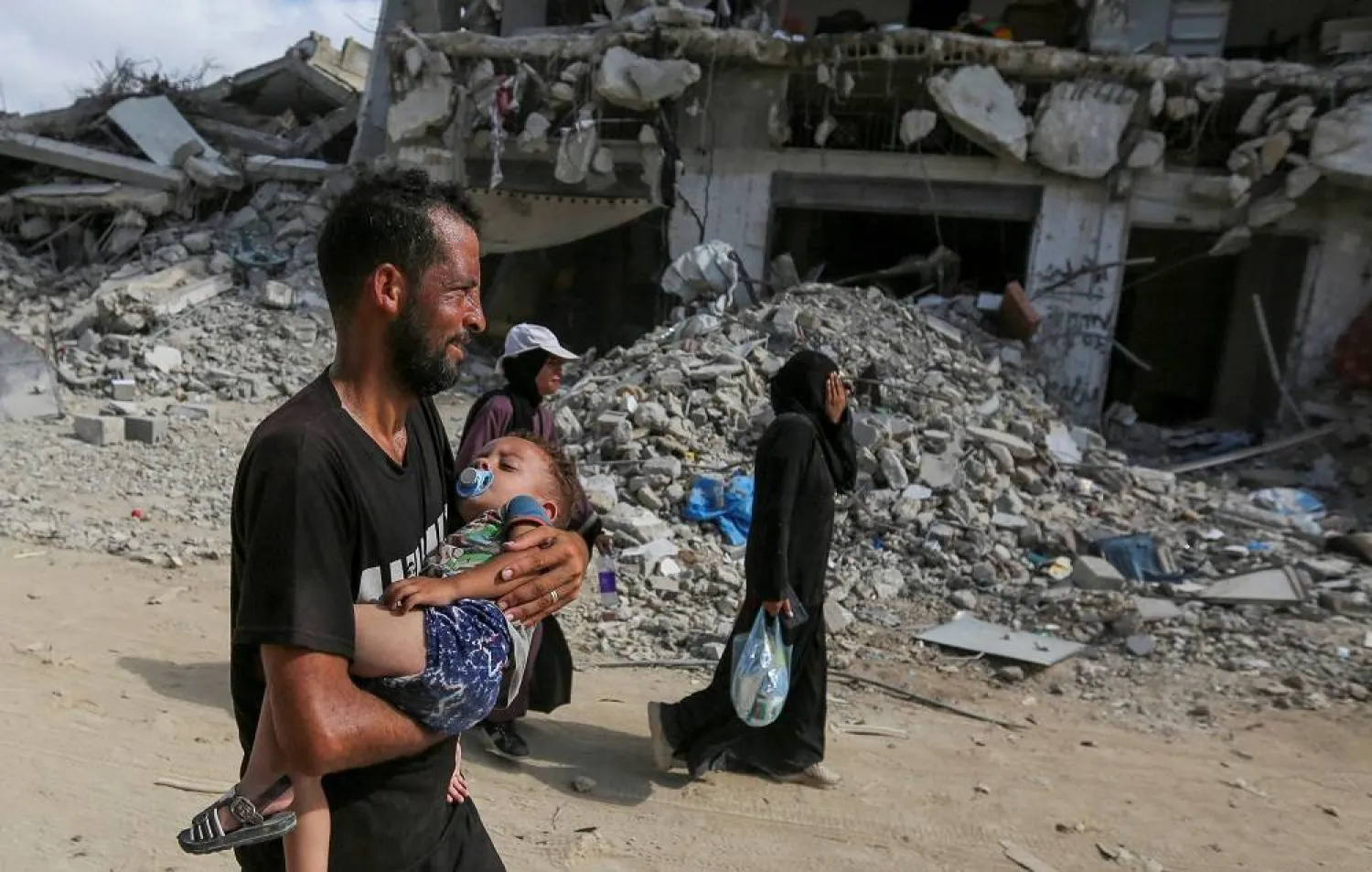A steady stream of miserable children and worried parents flowed into the dermatology office at Nasser Hospital in central Gaza.
A toddler with a blue hair bow sobbed as her mother showed how the red and white spots covering her face have spread to her neck and chest. Another woman lifted her little boy's clothes to reveal the rashes on his back, butt, thighs and stomach. On his wrists, he had open sores from scratching. A father stood his daughter on the desk so the doctor could examine the lesions on her calves.
Skin diseases are running rampant in Gaza, health officials say. The cause, they say, is the appalling conditions in overcrowded tent camps housing hundreds of thousands of Palestinians driven from their homes, along with the summer heat and the collapse of sanitation that has left pools of open sewage amid 10 months of Israel's bombardment and offensives in the territory.
Doctors are wrestling with more than 103,000 cases of lice and scabies and 65,000 cases of skin rashes, according to the World Health Organization. In Gaza's population of some 2.3 million, more than 1 million cases of acute respiratory infections have been recorded since the war began, along with more than half a million of acute diarrhea and more than 100,000 cases of jaundice, according to the United Nations Development Program.
Cleanliness is impossible in the ramshackle tents, basically wood frames hung with blankets or plastic sheets, crammed side by side over wide stretches, Palestinians say.
"There's no shampoo, no soap," said Munira al-Nahhal, living in a tent in the dunes outside the southern city of Khan Younis. "The water is dirty. Everything is sand and insects and garbage."
Her family's tent was crammed with her grandchildren, many of whom had rashes. One little boy stood scratching the red patches on his belly. "One child gets it, and it spreads to all of them," al-Nahhal said.
Palestinians in the camp said clean water was almost impossible to get. Some wash their children in salt water from the nearby Mediterranean. People have to wear the same clothes day after day until they're able to wash them, then they wear them again immediately. Flies are everywhere. Children play in garbage-strewn sand.
"First it was spots on her face. Then it spread to her stomach and arms, all over her forehead. And it hurts. It itches. And there's no treatment. Or if there is we can't afford it," said Shaima Marshoud, sitting next to her little daughter in a cinder block structure they'd settled in among the tents.
More than 1.8 million of Gaza's 2.3 million people have been driven from their homes, often moving multiple times over the past months to get away from Israeli ground assaults or bombardment. The vast majority are now crowded into a 50-square-kilometer (20-square-mile) area of dunes and fields on the coast with almost no sewage system and little water.
The distribution of humanitarian supplies, including soap, shampoo and medicines, has slowed to a trickle, UN officials say, because Israeli military operations and general lawlessness in Gaza make it too dangerous for relief trucks to move.
Israel launched its campaign vowing to destroy Hamas after its Oct. 7 attack on southern Israel, in which some 1,200 people were killed and 350 abducted. Israel's assault has killed more than 39,000 people, according to Gaza health authorities.
"The solid waste management system has collapsed," said Chitose Noguchi, the deputy special representative of the UN Development Program's Program of Assistance to the Palestinian People.
In a report released Tuesday, the UNDP said Gaza's two pre-war landfills were unreachable amid the fighting and it had set up 10 temporary sites. But Noguchi said there were more than 140 informal dumping sites that have cropped up. Some of them are giant pools of human waste and garbage.
"People are having tents and living next to dumping sites, which is really, really critical situation in terms of the health crisis," Noguchi said.
Nassim Basala, a dermatologist at Nasser Hospital, said they get 300 to 500 people a day coming in with skin diseases. After the most recent Israeli evacuation orders, more people have crowded into agricultural fields outside the city of Khan Younis, where insects are rife in the summer.
Scabies and lice are at epidemic proportions, he said, but other fungal, bacterial and viral infections and parasites are also running wild.
With the flood of patients, even simple cases can because dangerous.
For example, Basala said, impetigo is a simple bacterial infection treatable with creams. But sometimes by the time the patient gets to a doctor, "the bacteria have spread and affected the kidneys," he said. "We've had cases of kidney failure" as a result. Scratched rashes get infected in the pervasive dirt.
He said creams and ointments were in short supply at the hospital.
Children are the most affected. But adults suffer as well. At the hospital's dermatology office, one man untied his dirt-covered shoes to show the painful looking sores on the tops of his feet and ankles where his rash had rubbed open. A woman held up her hands, chapped raw and red.
Mohammed al-Rayan, several of whose children in a tent outside Khan Younis, have rashes or spots, said he has taken them to doctors.
"They give us creams, but it's no use when you don't have anything to wash with," he said. "You put a cream and it gets better but then the next day it's back the same."
Parents are left struggling to comfort children with painful conditions that won't go away.
Manar al-Hessi's toddler cried as she spread cream on her forehead and chest, covered in scabs, sores and spots.
"It's horrible," al-Hessi said. "There are always flies on her face. She goes in the toilet or the garbage, and it gets in her hands. The filth is huge."









